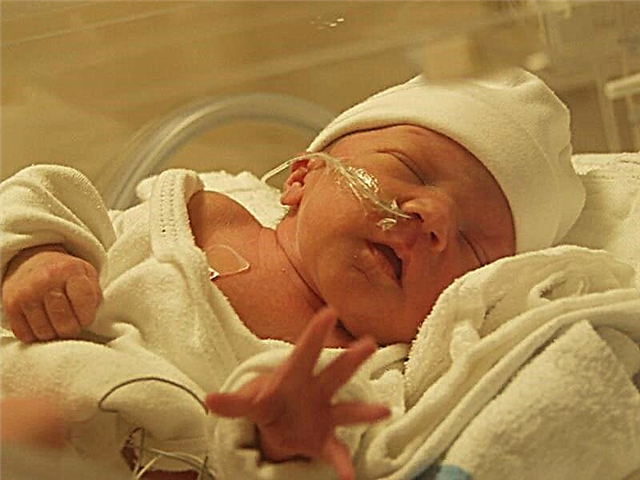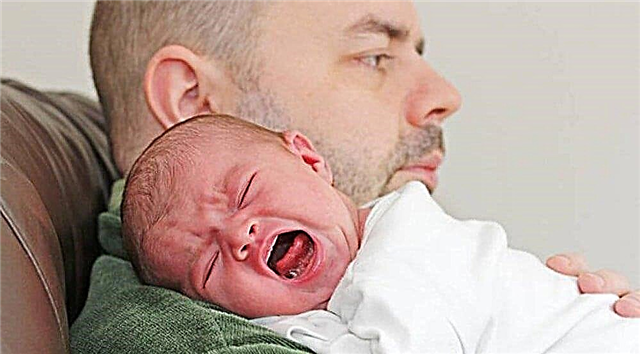A small infant does not have the ability to communicate in words about his problems and pain, but he has many other means by which he notifies his parents about his discomfort. First of all, these are tears and crying. If a newborn child is constantly groaning and pushing, he also tries to convey to his parents about his condition and discontent.

The grunting of the baby attracts the attention of the parents if he does not like something
If the baby is constantly groaning and pushing
There can be many reasons why a child grunts and becomes anxious. In any case, groaning and pushing suggests that the baby is trying to convey some information to the parents. You should observe the baby and analyze his behavior in order to exclude the irritant and the cause of the discomfort.
Intestinal colic in newborns
This is the most common situation why a newborn grunts and cries. The exact cause of colic has not been identified. Doctors assume that their appearance is associated with imperfect digestion processes.

Colic is a painful condition of a baby that is difficult to avoid
To get rid of the formed gases that interfere with him, the baby pushes and grunts. Often colic is accompanied by pain, so the baby will pull its legs to the stomach, bend, wriggle and cry.
Wet diapers or an overflowing diaper
If in a dream the child begins to groan and be capricious, then first of all it is necessary to check the diaper - most likely, it is full. After changing clothes, all the whims and anxiety of the crumbs should disappear. Extraneous noises can also cause restless behavior in a child. Sometimes the cause of poor sleep is an open window or a quiet TV.

A full diaper can be frustrating
Uncomfortable clothes
Modern parents are trying to get their kids high-quality natural things that are pleasant to the body and do not cause irritation. Very rarely, children's clothing is made of synthetic or hard fabrics.
With the wrong cut or low quality of the material, folds are formed, which cause discomfort in the baby, he begins to toss and turn. A child in infancy cannot straighten his own clothes, he signals discomfort with grunts and whims.
On a note. Sometimes the reason that the baby begins to wake up is the formation of folds in the bedding.
The baby strains and spits up after feeding
Trying and regurgitating after feeding is not always a common problem. More often than not, just one action provokes the appearance of the second. If the baby is pushing immediately after feeding, this condition can be caused by various reasons (colic, physiological characteristics, constipation).
Only then can regurgitation appear. It becomes the result of active actions that the baby performs immediately after eating.
If the little one is capricious and groaning during feeding, then the process of eating should be reviewed. Milk, the baby drinks from the breast or bottle, should flow smoothly. It is necessary to exclude the possibility of its stagnation.
Constipation in newborns
Stool problems are equally common reasons why babies grunt. Trying to poop, he pushes, begins to blush and moan, stops sleeping normally. The main solution to the problem of constipation is to revise the diet.

If the child is pushing and grunting, then, most likely, he cannot poop
If the baby is bottle-fed, then the mixture is changed. You can add prune and apple puree to complementary foods. If the baby feeds on breast milk, then the mother needs to introduce laxatives into her diet (vegetable oil, prunes, dried apricots, kefir, yogurt, kefir). Constipation is common when there is a lack of fluid or vitamin D deficiency.
To help the baby to poop, they do special exercises with him (gently press the legs to the tummy). If the constipation problem persists, a small enema is given or special suppositories are used.
Physiological age characteristics
In a newborn child, not all systems and organs are finally developed, their functioning is not adjusted. Usually the muscles of the anterior abdominal wall and the rectal sphincter, the bladder are still weak. Even soft feces do not exert the necessary pressure and do not cause a conditioned reflex to empty. The kid groans, but cannot poop. Sometimes the baby is anxious and makes similar sounds if he has a sore throat.
Many age-related features of a small organism become the causes of groaning, but at the same time they are not a disease or pathology:
- binge eating;
- any discomfort (dirty diaper, heat or cold, uncomfortable or hard clothes);
- manifestation of dissatisfaction or desire;
- the formation of dry crusts in the nose due to dry indoor air.
If you observe the baby's behavior a little, you can independently determine the cause of the sounds and correct the situation.
Reasons not to worry
Sometimes the groaning of the baby is not associated with serious reasons, while you should not panic and call the doctor or grandmothers. Initially, it is recommended to observe the child's behavior.

Dry air can cause crusts in the nose
On a note. Often, when sucking at the breast, the baby grunts, grunts and sniffs with pleasure or effort. Similarly, he can make similar sounds when laid out on his tummy. The baby intuitively tries to crawl, which requires effort from him.
Often, when a newborn is angry, he makes puffing, grunting and other sounds. All these moments should not cause panic among the parents.
How to help your baby if he has gas
Almost every child suffers from gas in the first months of life. This is due to the fact that not all his organs, including the digestive system, have formed and strengthened. Parents can only help the baby using methods that have already been tried and tested:
- Laying out on the tummy. This position helps to strengthen his muscles. In this position, the baby observes the world around with great interest. They start spreading from 1-2 minutes, gradually increasing the time. They do this before feeding, as babies spit up after eating.
- Column wear. Placing the child upright after eating is a good prevention of gas. At the same time, it is best to press the baby with your tummy to you. Only after the excess air comes out in the form of belching, can the crumbs be returned to a horizontal position.
- Heat helps to get rid of gas. The diaper is heated with an iron and applied to the tummy. You can use a heating pad with warm water. Warm baths help get rid of an attack of colic if the baby loves to swim.
- Massage also tackles the problem. Perform it after 30 minutes. after feeding or after the first signs of gas. The baby is laid on the back and made with the legs "bicycle", you can also gently move your palm over the swollen tummy.
- Medicines. With frequent gas formation, you can ask the doctor to prescribe a medication that will help relieve the attack. There are a number of medicines that are based on natural herbs. They require regular consumption to prevent colic.
- For prolonged and painful attacks, pediatricians recommend the use of emergency funds: enemas and gas outlet.

With the help of a light massage, you can relieve an attack of flatulence
If you properly care for the baby, follow all the doctor's recommendations for feeding, then you can prevent the problem of gas formation.
On a note. If the baby is breastfed, then the mother should reconsider her diet. It is necessary to remove from it all products that increase gas formation: buns, peas and other legumes, cabbage.
When to see a doctor
If the child grunts and struggles all the time, parents will be able to cope with most of the problems on their own. In some situations, medical attention is indispensable. You need to see a doctor if:
- there is an increase in body temperature;
- the child refuses to eat, has stopped gaining weight;
- the baby constantly spits up profusely;
- constipation and bloating are regular;
- traces of blood and a large amount of mucus appeared in the feces;
- the baby arches its back, cries in a dream and during wakefulness.
Symptoms like these signal problems with the baby's health or significant disturbances in care. The pediatrician will help to establish the cause and correct the situation, who will explain why newborn babies grunt and what needs to be done in each situation.
A few rules for a restful baby sleep
According to Dr. Komarovsky, only a deep sleep of the baby can guarantee that the mother will also get enough sleep and will be full of energy in the morning. Only parents can provide all the conditions for normal sound sleep, for this they need to follow simple rules and recommendations:
- In relation to the baby, it is necessary to show care and attention, the family should have a calm and friendly atmosphere.
- It is important to constantly adhere to a certain daily routine that parents create in accordance with their own needs.
- The kid should fall asleep in a permanent place. This can be a separate crib or a parent's bed.
- Bedding should be correctly selected: the mattress is even and dense, linen made from natural fabrics.
- You cannot save money on the child, so diapers must be of good quality.
- In the room where there is a crib with a baby, optimal indicators are maintained: temperature - + 18-20 ° C, humidity level - 50-70%.
- Games and entertainment in the evening should be calm (reading fairy tales, songs, educational activities), the most active period is in the daytime.
- Before an evening swim, the baby is given a massage, air baths or light gymnastics.
- In order for the baby to eat as much as possible at night, it should be slightly undernourished before that.

Only parents can organize all the conditions for healthy sleep of the baby
On a note. In the first years of a child's life, parents should pay maximum attention to the organization of children's sleep. Subject to all the rules, not only the baby, but also the mother will get enough sleep.

The kid can groan and sniff even in a dream, but this does not always mean that he has problems
Since a month-old baby is not able to help himself on his own or to talk about his problem, he attracts attention in any other way. If parents make mistakes, or something bothers the baby, he will certainly begin to groan, push. A more effective way to get attention is through crying and whims.



